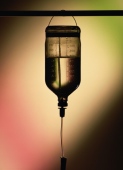- Recognizing the Signs of Hypothyroidism
- 10 Strategies to Overcome Insomnia
- Could Artificial Sweeteners Be Aging the Brain Faster?
- Techniques for Soothing Your Nervous System
- Does the Water in Your House Smell Funny? Here’s Why
- Can a Daily Dose of Apple Cider Vinegar Actually Aid Weight Loss?
- 6 Health Beverages That Can Actually Spike Your Blood Sugar
- Treatment Options for Social Anxiety Disorder
- Understanding the Connection Between Anxiety and Depression
- How Daily Prunes Can Influence Cholesterol and Inflammation
80 Percent of Cancer Docs Have Faced Drug Shortages: Survey


Four out of five doctors who treat cancer were unable to prescribe their medication of choice at least once during a six-month period because of a drug shortage, according to a new survey.
The survey also found that more than 75 percent of oncologists were forced to make a major change in patient treatment. These changes included altering the regimen of chemotherapy drugs initially prescribed and substituting one of the drugs in a particular chemotherapy regimen.
Such changes might not be well studied, and it might not be clear if the substitutions will work as well or be as safe as what the doctor wanted to prescribe, experts say.
“The drugs we’re seeing in shortages are for colon cancer, breast cancer and leukemia,” said Dr. Keerthi Gogineni, an oncologist who led the team conducting the survey. “These are drugs for aggressive but curable [cancers]. These are our bread-and-butter drugs for common cancers, and they don’t necessarily have substitutes.”
“When we asked people how they adapted to the shortages, they either switched combinations of drugs or switched one drug within a regimen,” said Gogineni, of the Abramson Cancer Center and Perelman School of Medicine at the University of Pennsylvania. “They’re making the best of a difficult situation, but, truly, we don’t have a sense of how these substitutions might affect survival outcomes.”
Results of the survey were published as a letter in the Dec. 19 issue of the New England Journal of Medicine. The survey included more than 200 physicians who routinely prescribe cancer drugs.
When substitutions have to be made, it’s often a generic drug that’s unavailable. Sixty percent of doctors surveyed reported having to choose a more expensive brand-name drug to continue treatment in the face of a shortage.
The difference in cost can be staggering, however. When a generic drug called fluorouracil was unavailable, substituting the brand-name drug Xeloda was 140 times more expensive than the desired drug, according to the survey.
Another option is to delay treatment, but again, Gogineni said, it’s not clear what effect waiting might have on an individual patient’s cancer. Forty-three percent of oncologists delayed treatment during a drug shortage, according to the survey.
Complicating matters for doctors is that there are no formal guidelines for making substitutions. Almost 70 percent of the oncologists surveyed said their cancer center or practice had no formal guidelines to aid in their decision-making.
Generic chemotherapy drugs have been at risk of shortages since 2006, according to background information accompanying the survey results. As many as 70 percent of drug shortages occur due to a breakdown in production, according to the U.S. Food and Drug Administration.
The FDA proposed a new rule in October for drug manufacturers who expect a drug shortage. The new rule requires drug makers to give the FDA at least six months’ notice before a possible interruption in a drug’s supply. However, the rule also allows for notification to take place as much as five days after an interruption in supply has occurred.
The FDA is also working with manufacturers to identify possible production problems earlier in the process, with the hope of preventing shortages.
Dr. Len Lichtenfeld, deputy chief medical officer for the American Cancer Society, said drug shortages are a serious problem.
“It’s been getting better in some respects because of some of the attention being paid to the problem, but I don’t believe the situation has improved markedly,” Lichtenfeld said. “The causes of the problem are many, and we just don’t know what the solutions are.”
“Generics manufacturers work on very thin profit margins,” Lichtenfeld said. “Every piece of their production is choreographed and planned. Their lines are working every day, 24 hours a day, and each line may produce more than one drug. If there’s a breakdown — if you interrupt this just-in-time manufacturing process — you end up with a serious problem. Most of the infrastructure is older plants, and there’s little to no reserve capacity.”
This is one of the reasons some of the mainstay generic cancer drugs are currently in shortage, Lichtenfeld said. One manufacturer, Ben Venue, had a number of production problems it couldn’t fix in a way that would allow it to maintain profitability. The company ultimately chose to go out of business, according to a company news release.
Unfortunately, Lichtenfeld said, this means the problem of drug shortages isn’t going away any time soon.
Lichtenfeld said it’s not really possible to develop guidelines for substitute drugs because these shortages are moving targets — what’s in short supply today might not be tomorrow, and what’s in good supply today could be in short supply months from now.
One expert agreed that the problem is serious.
“This is a real issue with the potential to affect quality of care, and we don’t have a lot of direction on which second-line drugs are best,” said Dr. Subhakar Mutyala, associate director of the Cancer Institute at Scott & White Healthcare, in Temple, Texas.
“[These shortages] will make health care more expensive,” he said. “If we have to spend more on brand-name chemotherapy drugs instead of generic drugs, that money will have to come from another part of the health care system.”
More information
Learn more about current drug shortages from the American Society of Health-System Pharmacists.
Source: HealthDay
Copyright © 2026 HealthDay. All rights reserved.










